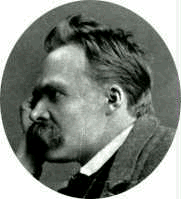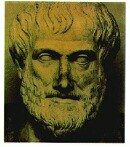
Alfred North
Whitehead's excuse for expressing his thought in the format
of
a system can be found from his grounding in mathematics. In his
later work he tried to find a system of abstractions truly
appropriate for conceptualizing becoming as process. These turn out
to be very abstract indeed - in Process
and
Reality, Whitehead
(1861-1947) seems to
invent an altogether new language, a language which may turn out to
be a map sent to thinkers yet unborn. Mathematics has often sent
such maps across the generations to future physicists, but, in
modern times, not before Whitehead do we have one so clearly
addressed to future philosophers. |
|
Whitehead, like the other thinkers we
are considering, understood that 'the chief danger to philosophy is
narrowness in its selection of evidence' ‡.
He too raised questions of methodology as
crucial for encountering the connectedness of unifying processes.
Nevertheless, for Whitehead it was second nature to suppose that
thinking's task was to establish systems, to be grounded in
postulates and categories, which would be adequate for exhibiting
the conditions of actuality.
|
|

With
news
the
time's
in labour,
and
throws
forth
each minute
some.
|
Whitehead's method of extensive
abstraction, because it
employs ideas after the fashion of mathematics, distills for
thinking an unequaled perspective
upon what
ideas on their own terms are qualified to bring to thinking.
Romantic thinkers had found ideas' movement of transcendence toward
the future to be a key articulation of mind's essential freedom.
For Whitehead, such an effect is part of an overall creative
advance, which is not attached to the past identity of
individual wills. The order ideas
bring
belongs less to generalizations of past experience, and more to
experience under anticipation and in relation to its
potentials. The grade of experience
regulated by
ideas owes its individualization and unity not to continuity with
the past but to lures for feeling which thereby
incessantly
instantiate conceptual reproductions and conceptual
reversions, sifting process into concrescent
moments of
becoming. That we read Whitehead as addressing himself to the
future is perhaps of a piece with how he brings one to share a
vision of conceptual elements' origins as potentials, and how
their prehensive ingression gives the conceptual a
role which
yields satisfaction to occasions of becoming.
|
|
 |
On quite the other side of
the philosophic tracks
we also have Nietzsche
explicitly addressing his work to thinkers still to come. But while
Whitehead's passport beyond his own time is a mathematical
orientation, Nietzsche's is established on the basis of his turn
toward literary expression. In many ways these two thinkers could
not be more different. There are, however, compelling similarities
in their pervasive reliance on physical and biological templates to
describe the organization of time and experience, as well as shared
interest in the repetitive component of 'becoming'. In
addition, each appeared to regard his thought as an inversion of Kant's Subjective Idealism into an
'objective
realism'.
Whitehead's
system
followed the traditional vein of philosophy in focusing everything
through what is knowing.
Nietzsche's practice, on the other hand, worked to emphasize
not knowing but living. What we might come to know, and for
Nietzsche this is perhaps most essentially how the future breaks
into and awakens the present, is first of all something like
medicine - risky medicine - which life prescribes to itself for
strengthening and purifying the fires by which it makes change its
own.
Nietzsche
subsumes what
might otherwise be called knowledge into acts transvaluing
established values, acts which mean to alter the dynamics of life
insofar as it had relied on established systems of value. Thus
though Nietzsche, like
Whitehead, is turned toward the future, toward becoming, his
commitment to practice rather than method appeals to a sense of
'realism' and 'objectivity' more vitally felt (Nietzsche might have
said 'endured') than, as in Whitehead, formally apprehended. |
|
 W Whitehead's map certainly
is OF life - he even
calls his work a
'philosophy of organism' - but it is FOR
mind. What there is to be known - ultimately for Whitehead
novelty - precipitates, as does its knowing, from a field of
potentiality (recalling perhaps the complement of a form in the
Projective Geometry so loved by Rudolf
Steiner). In Whitehead's work neither the knower nor the
known
can be easily pointed at except as if in reading a map. The only
actual 'here' constituted through understanding as Whitehead
understood is in the bifold mental movement of
abstracting/particularizing which arrives at the apprehension of a
concreteness. While
Nietzsche's riddles seem prophetic of much that since has
come
to us, Whitehead's map has yet to show us very much of its
territory. Still, it should be mentioned that Whitehead offers a
position, most often a position close to the one advanced in this
exposition, on almost every topic we discuss. |
|
 |
For
Whitehead mind transcends, and for Nietzsche life transvalues,
through individualizing movements that face the future, movements
nevertheless significantly different from the Will's subjective
synthesis as it was envisaged by the Romantic philosophers.
Nietzsche does call his central principle of synthesis Will to
Power, but by this he invokes finalities which are objective rather
than subjective. Will to Power characterizes progressively more
inclusive gatherings of beings as the principle of unification by
which life advances the scope of its embodiment.
But Nietzsche
remains a
pluralist and does not refer Will to Power's unifications to an
ultimate Oneness. Nietzsche's teaching of an Eternal Return, where
a world of becoming, through incessant reiteration approaches
indistinguishability in principle from a world which could be
described as timeless, asserts a fictional status for the Oneness
important to traditional philosophy, even as it proposes newly
meaningful roles in thinking for such fictions. |
|
|
There's not
the smallest orb
which
thou
behold'st,
but
in his
motion
like an angel
sings.
|
The unifications on the
basis of which Whitehead
approaches
objective synthesis play their part in an
overall
movement whereby the many become one even as one is added to the
many: Whitehead realized that in process-thinking synthesis
presupposes equal status for its terms, hence Whitehead is at pains
to avoid both pluralism and monism in their usual senses. |
|
|
In their own
thinking, both Whitehead and Nietzsche pretty much dissolve the
notoriously ambiguous philosophic distinction between
transcendence and immanence. Similarly,
the approach
taken here is to emphasize instead simply the kind of light
experience receives in virtue of its synthetic activity. What is
meant by transcendence in that context is found as
that
light verges toward an intensity which fuses the relative Many into
an Absolute One (transcendence) or illuminates forms
of
experience which are Absolutely ambivalent in their alternative
status as 'internal' or 'external' (transcendental -
as in
Kant and Hegel).
|
|
|
The
unifications towards
which, by synthesis, experience transcends in both Whitehead
and Nietzsche
are moments
precipitant from potentialities. On the basis of their derivation
from that futural temporality, and from their
essential
recurrent incessance, we are now in a position to more definitively
name as insistence such movements toward
transcendence. Here
we intend to establish a contrast with the transcending movement
which which we have called submission, as found in
the work
of Dilthey
and Husserl.
Insistence
realizes transcendence from the closures procured through synthetic
unifications of experience. Submission, on the
other hand,
inquires after transcendence through attention to the
constitution of experience so as to suspend synthesis, and
realizes transcendence at points of rupture where experience
exceeds a capacity for containment.
|
|

 |
Focusing on kinds of
thinking which set their
sights by what we now call insistence, we actually
spy the
mainstream of western thought in its course from Aristotle's seminal concerns
with causality
through the Nineteenth century's subjectivization of cause as
productivity and will. Even the modern takes on insistence's
transcendence, closures given either from powers excercised - as in
Nietzsche's
radicalization of Aristotelian physicality, or from being absorbed
to the efficacies of a near
Platonic 'objective immortality' of form in Whitehead,
encounter common
limits where they spin their wheels with little effect. One symptom
of those limits philosophers have long called 'the problem of
secondary qualities'. They name by this feelings of
color ,
smell, temperature, and everything we in fact appreciate as the
qualitative side of experience. Apparently the closures effected in
synthesis re-present experience so as to shut out much of that
texture of life. Responsible thinkers nevertheless attempt to
assign positions even to what their modes of thought exclude. |
|
 |
Whitehead's invocation of Novelty
as divinity exhibited in creative advance, smacks
of a
'qualitative mana' at the end of his 'rainbow' of dynamic formal
relations. In a similar sense the qualitative is summarized, given
place as an intensity, but not as a place where differences are
held for 'hearing', in the progressively inclusive gathering of
beings which Nietzsche
calls Will to Power. Both
Whitehead's
concrescent prehensions of becoming, and Nietzsche's gathering
powers of becoming, are limited in their characterizations of
qualitative depth to a dimension of unificatory intensity.
This is not to say that the intensities offered through Whitehead's
Novelty and Nietzsche's Will
to Power play equivalent
roles. Nietzsche's commitment to practice disallows him Whitehead's
speculative immersion in what Herman
Melville called 'Plato's
honey-head': Nietzsche's Will to Power shows itself
to be a
more discomfiting object of contemplation than Whitehead's
Novelty. Indeed, part of its role for Nietzsche was to keep
him
on his feet.
|
|
Now, had Tashtego
perished in that (whale's) head, it had been a very precious
perishing...
How many, think ye, have likewise fallen into Plato's honey head,
and sweetly perished there?
-
Herman
Melville
|
 
|
|
|
|
|
|
|
|














